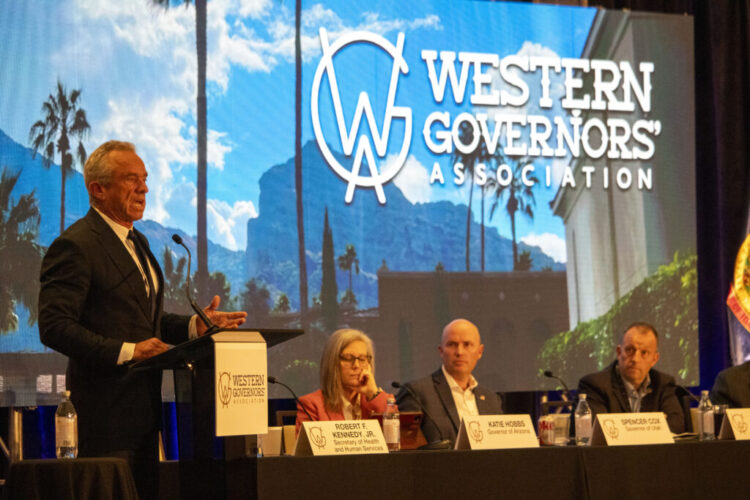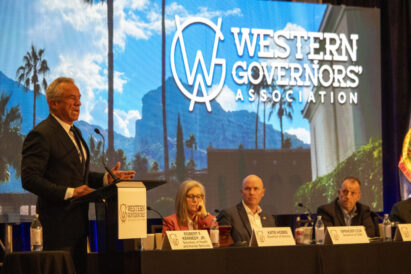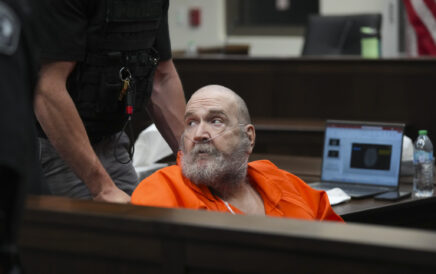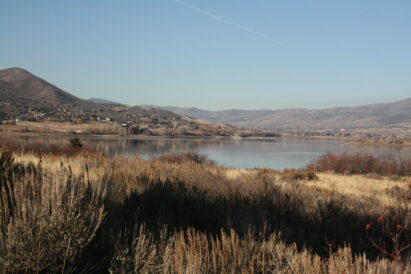Western governors meet with Trump officials on water, energy, Medicaid cuts

Photo by Jerod MacDonald-Evoy, Arizona Mirror
U.S. Health and Human Services Secretary Robert F. Kennedy Jr. addresses the Western Governors Association’s winter meeting in Paradise Valley, Ariz. From left to right, Arizona Gov. Katie Hobbs, Utah Gov. Spencer Cox and Hawai’i Gov. Josh Green listen.The governors of multiple western states touted their willingness to work across the aisle as they met with members of the Trump administration at a ritzy in a wealthy Phoenix suburb Thursday to discuss issues ranging from powering data centers to Congress’s Farm Bill.
“We work together in service of the region and the nation as a whole,” Utah Gov. Spencer Cox told reporters Thursday morning at a press conference prior to the start of the Western Governors Association’s winter meeting at the Omni Scottsdale Resort and Spa in Paradise Valley. “Working together actually still works.”
Cox was joined by Arizona Gov. Katie Hobbs, Hawai’i Gov. Josh Green and Montana Gov. Greg Gianforte, all of whom touted the “bipartisan” nature of the WGA gathering, which featured Trump cabinet officials Robert F. Kennedy Jr., the secretary of the Department of Health and Human Services, and Doug Burgum, who heads up the Interior Department.
The WGA’s winter meeting also featured three panel sessions dedicated to issues impacting western states: data center energy demands, the upcoming reauthorization of the Farm Bill and the growing need for broadband internet in rural areas.
The meeting comes as many of the western states present have failed to meet a deadline on an agreement on how to share Colorado River water.
“We know that we all are going to have to work together and make sacrifices,” Cox said when asked by reporters about the recent water woes, adding that the states are “working closely together” to avoid federal intervention. Hobbs, who has been sharply critical of Upper Basin states like Colorado and Utah for refusing to accept cuts in their water supply, noted that she had a meeting scheduled with Burgum to discuss the negotiations.
That facetime with Trump administration officials was something all the governors touted as a major positive for the gathering Thursday, adding that it allowed them the ability to voice their concerns about a number of issues facing their states.
That includes the impending cuts to Medicaid that will cut health care spending for the state-managed programs by $1 trillion over the next decade and kick an estimated 12 million people off their health insurance.
Cox and Gianforte, both Republicans, said they feel they’ll be able to “absorb those cuts” when they hit their states.
Green and Hobbs, both Democrats, were less optimistic. Green said that Hawai’i will look at using its rainy day fund to supplement money lost from the cuts, while Hobbs said her administration is looking into how Arizona will mitigate the impacts of the federal cuts when the state legislature begins crafting a budget in January.
But the state doesn’t have the money to replace what the Trump administration is taking away, she said.
“We cannot backfill the cuts,” Hobbs stressed to reporters.
Ag to Data Centers
One issue of particular importance to western states is the proliferation of data centers used to drive the artificial intelligence industry, and the unprecedented energy demands that have come with them.
With the AI boom, there has been an explosion in the number of data centers — facilities that can be hundreds of thousands of square-feet large and are filled with computer servers — that run and operate the AI systems. They require a large amount of power and are straining energy providers, resulting in higher rates for residents in many cases.
“We’re trying to do more faster,” Cully Cavness, president and COO of Crusoe Energy, an AI data center startup that recently raised $1.3 billion, told the governors.
To Cavness and others on a panel discussing data center expansion, local permitting is the primary reason more data centers haven’t already been built. The panelists, which included businesses with billions invested in AI and data centers, all agreed that speeding up the permitting process for data centers is key to creating more.
Cox and others see building out more data centers as integral into an “AI arms race” with China, an argument that Burgum echoed later during his keynote speech.
Farm bill
While technology took up a majority of the conversations Thursday, panelists also discussed with governors another pressing issue: food.
“It seems like the support is there, but it is being piecemealed, and it can’t be piecemealed,” Geri Byrne, a supervisor in California’s Modoc County and chair of the Rural County Representatives of California, said about the ongoing congressional debate around the Farm Bill.
The Farm Bill, a package of legislation that is passed every five years, governs the ways agriculture and farming is done in the United States. The current bill expires in September 2026.
Byrne said she is worried that partisan gridlock in Congress means the favored strategy has been to “piecemeal” parts of the legislation to win approval on easier components of the policy package. But that means negotiators will have a difficult time getting the support needed to get a “clean” version of the bill next year.
“I’m sorry to get political,” said Stanley Dick, a commissioner from Cavalier County in North Dakota, voicing a concern that the Trump administration will not agree to a five-year version of the bill because it likes “short-term things.”
“Things change politically real quick right now,” he said, adding that a “skinny bill” is something he has been hearing about that has been resonating more than a long-term fix with people in Washington, D.C.
And while Dick, a farmer himself, said he found the discussions around data centers fascinating, he was more concerned about trends among farming. Half of the farmers in the United States are over the age of retirement and the cost of entry into the field is often high.
“I mean, how long can we go without food?” Dick asked the attendees.
The main event
The day’s work ended with a pair of keynote speeches from Burgum and Kennedy.
Burgum told the governors about the administration’s plans for “energy dominance,” which has included moving away from renewable energy and moving back towards fossil fuels. During his time at the Interior, Burgum has helped fast-track fossil fuel extraction on public lands, uranium mining permits and looked to speed up permitting for nuclear power.
“It is innovation, not regulation, that has led to American greatness,” he said.
Burgum defended the administration’s decisions as being imperative to keep pace with China, claiming that if environmentalist groups are worried about pollution, then they should be wanting the United States to be engaged in drilling for oil and mining and not other countries.
“We should be insisting this all be happening here,” Burgum said.
Burgum also decried environmental groups who he claimed use the Endangered Species Act to delay and stop projects simply to “raise money.” He also claimed that environmental assessments, which are required to ensure projects do not impact sites, take too long so his office has been using AI to speed up the process.
While Burgum drew a considerable crowd, it was Kennedy who brought the most people into the ballroom.
Kennedy, who repeated a number of false claims during his keynote speech, received pushback from Green, who was a family physician before becoming governor.
“If (people) see us fighting, the doubt itself can be harmful,” Green said during a back-and-forth between the two men about vaccines.
Kennedy has been an outspoken crusader against vaccines, and Green had asked how he could ensure that the agency he oversees does not create undue harm or panic with the messages they are putting out in regards to vaccines. (The day before the WGA meeting, the Centers for Disease Control and Prevention, which Kennedy oversees, changed its website to say there is a link between vaccines and autism. Such connections have been pushed by Kennedy and other anti-vaccine activists, but have been long debunked by a large body of high-quality scientific research.)
Earlier this year, multiple states began issuing standing orders for the COVID-19 vaccine amid moves by HHS to make the vaccine only available via a prescription to certain individuals.
“I’m not trying to take away anyone’s vaccines,” Kennedy said to Green. “What I want is to make sure vaccines are properly tested.”
Vaccines, especially childhood vaccines, undergo rigorous scientific testing. They are safe and have virtually eliminated many childhood illnesses that left children disabled or dead.
Both Green and Kennedy, though, could agree that having the government be open and honest to the best of their abilities is something to aim for. They also agreed that Washington D.C. is dysfunctional.
“I am pessimistic about finding common ground on Capitol HIll,” Kennedy said. “No one is even talking to each other.”
This story was originally produced by Arizona Mirror, which is part of States Newsroom, a nonprofit news network which includes Utah News Dispatch, and is supported by grants and a coalition of donors as a 501c(3) public charity.



